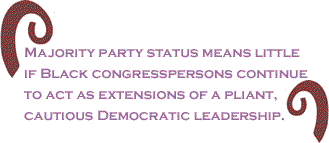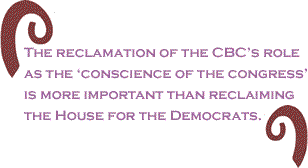
|
|||||||||||||||||||||
 |
|||||||||||||||||||||
 |
|
|
The Democrats hope for – but are doing next to nothing to achieve – victory at the polls in November. Should that unearned triumph occur in the U.S. House of Representatives, African Americans will ascend to key committee positions, potentially pivotal to national policy and budgetary direction. But what will they do with these new franchises? Let’s not be fooled by the corporate media’s (and corporate Black folks’) framing of the contest in November as simply which party controls what committee of congress. Majority party status means little if Black congresspersons continue to act as extensions of a pliant, cautious Democratic leadership that is not committed to fundamental domestic and geopolitical transformation. The crisis in African American leadership at the congressional level cannot be resolved outside the dynamics of the Black body politic. A Democratic victory in 2006 does not necessarily translate to a Black victory unless Black Democrats stand for something. Black power can only result from Black demands – and, at present, Blacks are demanding nothing from the Democratic Party. We must not mistake virtual electoral success for the actuality of power to affect real social change.
Democratic triumph and Black success are not synonymous. Just because Republicans can be counted on to equate Black power and Democratic power, doesn’t mean it is the same thing. We must stop buying into the liars’ racist prevarications, which only serve others who are supposed to be – but are not – our friends. Republican racism scared Black folks so badly during the Bill Clinton era that some fools anointed him the “first Black President.” This fear-frenzy contributed to the neutering of the Congressional Black Caucus (CBC) and the Black body politic at-large, from which we have not yet recovered. The same theatrics are scripted for this election year. If Blacks buy into the narrative, African American political power will once again be subordinated to white Democratic ambitions. As usual, Republicans lead in this dance. Anticipating that the Iraq war and a tsunami of GOP scandals might allow the popular Democratic tide to seize control of the House and – an even more remote possibility, the Senate – Republicans resort to their tried-and-true default tactic: race baiting. The GOP has already launched “fear of the Black menace” as the sub-text of their mid-term election defense strategy. The bogeymen are John Conyers, Jr. (D-MI), the longest serving Black member in the House, who would assume chairmanship of the Judiciary Committee, and Charles Rangel (D-NY), the second most senior Black member and heir to chairmanship of the Ways and Means Committee. Other members of the Congressional Black Caucus, such as Alcee L. Hastings (D-FL) would also rise to influential positions, should the Democrats prevail in November. Republicans flash pictures of Black faces threatening to invade high congressional places, hoping to set off a reflexive, white racist electoral reaction. John Conyers is depicted as a man intent on using the Judiciary Committee chairmanship to impeach George Bush – a direct Black threat to white power.
Although BC is certain that Conyers would dearly love to impeach George W. Bush – just as Conyers contributed to the demise of Richard Nixon in 1974 – it is not only the Republican majority that stands in his way. Democratic Minority Leader Nancy Pelosi demands quiet and calm waters for what she thinks will be smooth sailing to conquest of the House. With Republicans determined to paint Democrats in blackface in order to induce a Pavlovian response from the white electorate, Pelosi has ordered the Congressional Black Caucus as a body to shut up. Keep a low profile. Don’t make waves. Wait until after the election. Maybe then…. Even such a formidable mover and shaker as John Conyers, whose 41-year cumulative progressive legislative record dwarfs all others in the House, could not resist Leader Nancy Pelosi’s warnings that he must delete the “I”-word – impeachment – from his vocabulary, so as not to stampede the white Republican hordes. “John Conyers is an enthusiastic advocate. I am the leader,” Pelosi told Tim Russert of Meet The Press on May 7. “Our caucus will decide where we go” on impeachment. Meaning, she will decide. Conyers acquiesced. In a May 18 column for the Washington Post, he wrote: “…rather than seeking impeachment, I have chosen to propose comprehensive oversight of these alleged abuses. The oversight I have suggested would be performed by a select committee made up equally of Democrats and Republicans and chosen by the House speaker and the minority leader…. “At the end of the process, if – and only if – the select committee, acting on a bipartisan basis, finds evidence of potentially impeachable offenses, it would forward that information to the Judiciary Committee.” Bush is the “Decider” – Pelosi is the “Leader-er.” But there can be no white leader of Black people, in or out of the congress. Pelosi’s victories are not ours. She is assuring Republicans and corporate America that she can keep the Black folks in check. However, in a nation in which Blacks are the only dependably progressive electorate, every diminution of African American political agency and independence weakens what remains of the progressive movement. Even if Democrats achieve a slim majority in the House in November, Pelosi and Senate Democratic Leader Harry Reid will not willingly unhook the leash on Black Democrats and other progressives. There will always be some reason to placate the ultimately implacable Republicans and their fellow travelers in the Democratic Party. Our time will never come, unless we seize it. A New Chairperson Right after the Labor Day weekend, in September, the Congressional Black Caucus holds its 36th Annual Legislative Conference, the year’s premier African American social – if not political – event. Since its founding in 1969, the CBC has grown from 13 to 42 members of the House and one senator. The Black delegation on Capitol Hill is much bigger, but far from better. No longer can the CBC claim to be the “conscience of the congress.” As Leutisha Stills of the CBC Monitor reported in the May 18 issue of BC, the Black Caucus “functioned quite well” on the basis of a progressive consensus during most of the first three decades of its existence. Those days are over.
A growing faction of corporate-bought members, including Artur Davis (AL), David Scott (GA), Harold Ford, Jr. (TN), Albert Wynn (MD), William Jefferson (LA), Sanford Bishop (GA), and Gregory Meeks (NY), often votes with Republicans on key, “bright line” issues. (See CBC Monitor Report Card, February 2, 2006.) Although CBC chairman Mel Watt’s (NC) personal voting record ranks him among the CBC Monitor’s “Honor Society,” he has done nothing to stem the growing rightward defections. Watt only jumps when Nancy Pelosi demands that he impose discipline on progressive CBC members – in particular, Georgia Rep. Cynthia McKinney. As Leutisha Stills wrote: “Acting more as the Black ‘Whip’ for Minority Leader Nancy Pelosi than as a facilitator of Black influence on Capitol Hill, Watt has relentlessly sought to quash all Black deviation from the party line. Since Democratic leadership is intent on saying and doing nothing that could draw media attention away from assorted Republican failures and corruption, Watt has played the role of ‘silencer’ of the CBC.” This year’s CBC Legislative Weekend will be co-chaired by Barbara Lee (CA) and Carolyn Cheeks Kilpatrick (MI). Both are progressive lawmakers, especially Rep. Lee, who was the only member of the House to vote against giving President Bush broad “war on terror” authority in September, 2001. Lee is also co-chair of the Congressional Progressive Caucus – Nancy Pelosi’s old slot, before her rightward turn as Minority Leader. According to The Hill newspaper, both Lee and Kilpatrick are actively campaigning to succeed Mel Watt as chair of the CBC in the next two sessions of congress.
Whoever replaces Watt, it won’t be a minute too soon. Should the Democrats win the House, the newly empowered Black committee chairpersons will need an active and non-subservient Black Caucus to back them up, to keep Nancy Pelosi’s cold hand from strangling progressive initiatives. Most importantly, the progressive majority of the CBC must be allowed to give voice to their political will. The old system of consensus no longer works, due to the infestation of corporate money which has created a bought faction of the CBC. The next chairperson of the CBC should endorse “sense of the caucus” procedures that would remove the bought-out faction’s power to veto the majority’s wishes. Only then will the Caucus be enabled to take a stand on vital economic and foreign policy issues – to speak for Black America as a whole. The CBC as a body will not regain respect until it frees itself from the machinations of white congressional leadership and the dead weight of its corporate-owned minority. From our perspective at BC, the reclamation of the CBC’s role as the “conscience of the congress” is more important than reclaiming the House for the Democrats. Above all else, we must reclaim our own house, and speak truth to power. Glen Ford and Peter Gamble are writing a book to be titled, Barack Obama and the Crisis in Black Leadership. |
|
| Home | |
Your comments are always welcome. Visit the Contact Us page to send e-Mail or Feedback or Click here to send e-Mail to [email protected] e-Mail re-print notice
If you send us an e-Mail message we may publish all or part of it, unless you tell us it is not for publication. You may also request that we withhold your name. Thank you very much for your readership. |
|
| May 25, 2006 Issue 185 |
||||||||||||||
|
||||||||||||||
|
||||||||||||||
| Printer Friendly Version in resizeable plain text format | ||||||||||||||
 |
||||||||||||||
 |
||||||||||||||
| |
||||||||||||||
| |
||||||||||||||






























